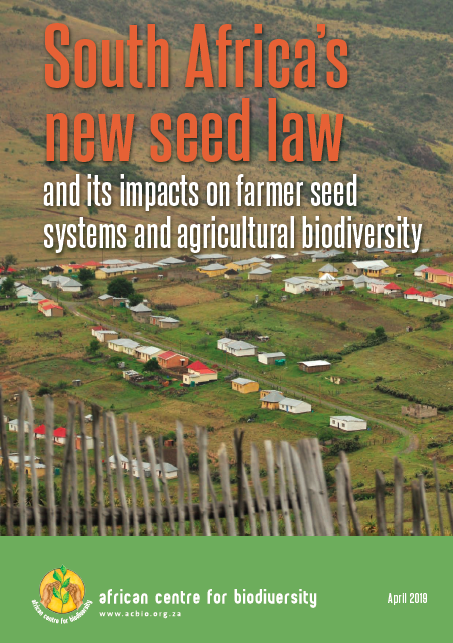Latest Resources

23 April 2019
South Africa’s new seed law and its impacts on farmer seed systems and agricultural biodiversity
In this updated briefing, the African Centre for Biodiversity (ACB) reflects on how the new Plant Improvement Act (PIA) 2018 will further undermine the rights of small-scale farmers while expanding the rights of the corporate agricultural sector, further entrenching its domination. The PIA, together with the new Plant Breeder’s Rights Act (PBR) 2018, was approved […]

17 October 2018
UPOV 1991 and the ITPGRFA: Key issues for farmer managed seed systems in South Africa
The South African government has called upon stakeholders to submit comments and attend stakeholder meetings on the 23rd and 24th October 2018, on the implications of South Africa acceding to the International Union for the Protection of New Varieties of Plants (UPOV 1991) and the International Treaty on Plant Genetic Resources for Food and Agriculture […]

1 September 2017
WEMA Project shrouded in secrecy: open letter to African governments to be accountable to farmers...
The Water Efficient Maize for Africa (WEMA) project promises to develop drought tolerance in maize for the benefit of small holder farmers, but is really a project designed to facilitate the spread of hybrid and genetically modified (GM) maize varieties on the continent. WEMA involves five African countries: Kenya, Mozambique, South Africa, Tanzania and Uganda. […]

10 August 2017
The Water Efficient Maize for Africa Project: Profiteering not Philanthropy
This scoping study aims to appraise, to the best of our knowledge, the current status of the roll-out of a public- private partnership which forms the the Water Efficient Maize for Africa (WEMA) project in five African countries: Kenya, Mozambique, South Africa, Tanzania and Uganda. The partnership is between the African Agricultural Technology Foundation (AATF), […]

28 November 2016
Biosafety aspects of genome-editing techniques
Biosafety TWN Briefing – Biosafety aspects of genome-editing techniques. You can download the paper here.

31 January 2011
Water Efficient Maize for Africa: Pushing GM Crops onto Africa
This paper looks at the Water Efficient Maize for Africa (WEMA) project within the context of the race by massive agribusiness corporations to bring climate change related crops to the market. The first part of the paper explains the WEMA project within this context, outlining the players and the stakes involved. It looks at who […]

28 October 2010
Synthetic Biology in Africa: Recent Developments
By Gareth Jones and Mariam Mayet The focus of this paper is the emerging field of synthetic biology, in particular its implications for the African continent. Synthetic biology combines a number of scientific disciplines and is generally understood to involve the deliberate design of biological systems, using standardised components that have been created in a […]

14 May 2010
A good neighbour? South Africa forcing GM maize onto African markets and policy makers
Since the beginning of 2010, South Africa’s Executive Council responsible for GMO permit approvals has granted export permits for almost 300,000 Metric Tons (MT) of GM maize to be exported to Kenya, Mozambique, and Swaziland collectively, and 35,000 MT of GM soybean to Mozambique.1 Despite South Africa being Africa’s largest producer of maize, and a […]

4 March 2010
The GM stacked gene revolution: A biosafety nightmare
Stacked GMOs are those containing more than one gene genetically engineered into a crop plant. A controversial stacked GMO, Smarstax containing 8 such genetically engineered genes, was commercially approved in the US, Canada, Japan and South Korea during 2009. Stacked gene varieties are highly complex, posing new biosafety risks that outpace the capacity of regulatory […]

13 January 2010
Africa’s Green Revolution Drought Tolerant Maize Scam
Prediction of exacerbated drought in Africa due to climate change is apparently the driving force behind the establishment of the Water Efficient Maize for Africa (WEMA) initiative, another prong of the so-called ‘New Green Revolution for Africa’ WEMA seeks to develop drought tolerant maize varieties through a program which is being presented as a panacea […]
